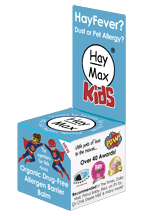

As 40% of Kids Suffer with Sneezes HayMax Comes Up with an Answer
Allergic rhinitis is estimated to affect as many as 40% of children, with up to 88% of them suffering with sleep problems, causing daytime fatigue and somnolence, and decreased cognitive functioning [1]. HayMax Kids is a non-drowsy allergen barrier balm that is suitable for children and works by trapping pollen before it enters the body..
The key to any allergy is avoidance – and this includes hay fever. If pollen is does not get in the body it cannot cause a reaction. Each child can tolerate a certain amount of pollen without reaction. However once this amount is exceeded (known as their ‘trigger level’) an allergic reaction occurs, and hay fever symptoms start to occur.
HayMax Kids works by trapping pollen before it gets in your body, keeping your child below their trigger level for longer. It is proven in independent trials to trap over one third of pollen before it enters the body [2].
HayMax Kids is completely drug-free and is made from 100% natural, organic ingredients, certified by the Soil Association. There are no drowsy side effects, so it will not affect your child’s performance at school or in their exams.
It is applied around the nostrils and bones of the eyes (but not too close to the eyes) in the morning and during the day. It is not a medicine and can be self-administered by your child at school.
It can also be applied before bed, to help trap pollen during the night, to help your child get a good night’s sleep.
Other useful tips for a restful night’s sleep are: shower before bedtime to remove pollen from the hair and body, ensure your child’s bedroom windows are kept closed to prevent pollen getting in the room, wash bed clothes regularly to prevent the build up of pollen, and dry your child’s pyjamas and bed linen indoors to prevent pollen being blown on to them by the wind.
HayMax balms have never been tested on animals (although some people claim they help their pets’ hay fever) and are approved by The Vegetarian Society. They have won over 40 awards, including a 2017 Mother & Baby Award for HayMax Kids. They are also very economical – one pot can last a whole summer.
Caroline Bays comments, “I got it for my 10 year old son last year. He was taking [antihistamines], nasal sprays, eye drops and was getting nose bleeds at all times of day or night. My friend had tried some HayMax, gave me a pot and said it might help. So I tried it on him and stopped the medicine over a period of a couple of days. He then managed the whole of last summer with just one pot of HayMax! That’s why I’m coming back for more again this year – thanks!”
HayMax Kids retails at £6.99 and is available from Holland & Barrett; selected Boots; independent chemists, pharmacists and health stores; on 01525 406600 and from haymax.biz.
NOTES TO EDITORS
References
[1] Pawankar R, et al, 2013
[2] Chief Investigator: Professor Roy Kennedy, Principal Investigator: Louise Robertson, Researcher: Dr Mary Lewis, National Pollen and Aerobiology Research Unit, 1st February 2012.
ENDS
For further information about HayMax Kids, or for product images, please contact:
Ian & Jenny Liddle, Excellart, 01450 219 246,
info@excellart.co.uk, www.facebook.com/Excellart, www.twitter.com/excellart

